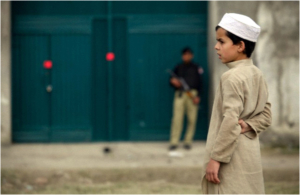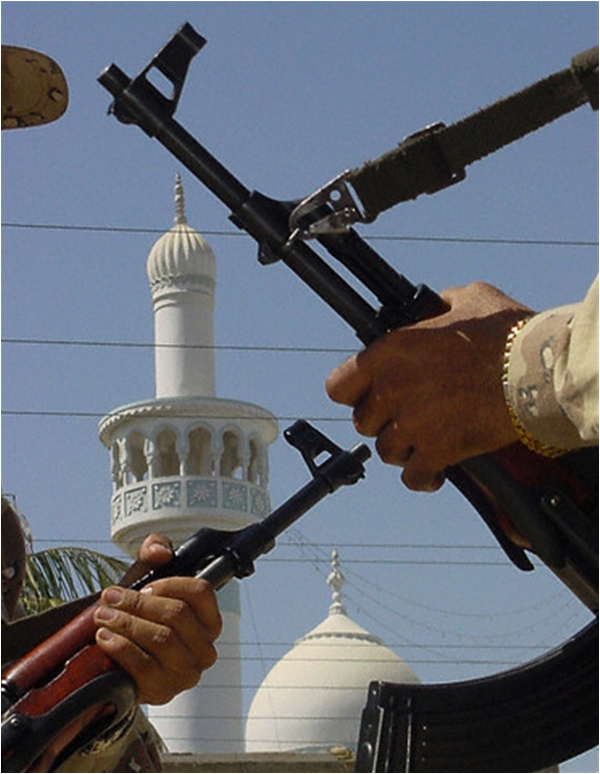The Pakistani government must take swift, effective action to implement its will and assert its authority.
Pakistan’s terrorism challenge has burgeoned into a full-blown national crisis. Terrorism emanates from extremist ideologies that use religion to glorify violence. In addition, when there is constant marginalization of particular sections of society, people are denied basic necessities of life and any aspirations for a better life are in vain, many are driven towards violence. In Pakistan, surveys have shown that while the masterminds of extremist outfits are often well-educated, their recruiting ground is among the under-privileged.
In Pakistan the extremist narratives emanate from three main sources—the mosque-madrassah complex, school curricula, and the media. The country’s policymakers and law enforcement agencies need to take appropriate steps targeting these sources in both the short and long term, if the menace of terrorism is to be effectively curtailed.
Terrorism emanates from extremist ideologies that use religion to glorify violence
Short Term Measures:
Credible information is needed about all mosques and madrassahs operating at the district, provincial and national level. At the district level, the District Coordination Officers (DCOs) should be tasked to map and monitor all mosques and madrassahs operating within his jurisdiction. All madrassahs should be required to be formally registered with the local authorities. Information collected from each district should then be compiled into provincial and national data banks containing verified information on those running these mosques/madrassahs, their activities, their donors etc. Any madrassahs with foreign funding sources and teachers should be kept under extra scrutiny. In addition, police officers need to compile their data from each district and create national data centers which can help law-enforcement agencies to identify and monitor suspicious activity in any part of the country.
Any funding from any sources, both local and international, should only be allowed to take place through formal banking channels. Businessmen and larger trade associations often provide financial support to madrassahs that are preaching extremist ideologies. The government needs to make it clear to such donors that continued support of blacklisted organizations will result in legal repercussions. Moreover, any madrassahs operating on illegally obtained land need to be immediately shut down.
The Friday sermon in mosques has become a means for many imams to propagate extremist ideologies and hate speech. Local police stations and administrative machinery at every union council level should proactively monitor mosques and madrassahs in their jurisdiction. Laws need to be implemented that restrict loudspeaker usage to just the call for prayer. Moreover, there is a need to raise awareness among ordinary citizens and urge them to report any imams in their area whose sermons contain hate speech or calls for violence. In addition, many outfits use posters, pamphlets and wall chalking to propagate their ideology. Printers and painters employed for these purposes also need to be investigated and punished by law.
A wider public awareness campaign by the government and political parties is also needed. The Ministry of Interior should prepare counter-narrative material. There is enough Islamic literature in the country that promotes peace and tolerance to counter the extremist ideologies being peddled in the name of religion. Sources like the articles and speeches of Dr Javed Ahmed Ghamidi need to be circulated through the press and other publications. It is important for a campaign like this to have the Prime Minister and other politicians at its forefront. For too long they have pandered to Islamist rhetoric.
Electronic media has grown in recent years in Pakistan. More people have access to the radio and television than ever before. The government regulatory body PEMRA needs to monitor television and radio vigilantly. Anchors and analysts who repeatedly give space to members of banned extremist outfits to boost ratings need to be taken to task swiftly by PEMRA. No media group should be exempt from this scrutiny. Usage of internet and social media is also on the rise in Pakistan. Social networking websites have become powerful tools in spreading hate speech and extremist messages. Instead of wasting resources on banning harmless websites like YouTube, the government needs to crack down on webpages clearly linked to TTP and other terrorist organizations.
The government needs to organize district and provincial level sectarian harmony meetings. Political parties should also activate their national and provincial legislators. Public representatives need to assume responsibility of overseeing the executive and monitor the progress being made towards implementation of the Prime Minister’s National Action Plan. Thus far, this is a resource under-utilized in provincial governance.
Community policing should be revived. Instead of setting up a network of lackeys, informants and henchmen, such engagement should be done through a structured system where community policing is a recognized legal function with elected or nominated personnel who moderate and resolve petty disputes on the spot. Community police will enable government to expand its eyes and ears inside the local communities.

High Courts should have a designated judge for terrorism cases
Long Term Measures:
There is urgent need for extensive reform in both madrassah curricula as well as textbooks taught in other school systems in Pakistan. Governments have made several efforts, but they have not been able to make substantial progress. The references to jihad and non-Muslims need to be either revised or contextualized. Without the proper context, background and history of a verse the meaning can leave an unintended impression on young minds. Similarly, the biased history; that belittles non-Muslims and feeds paranoia about the outside world, taught to students needs to be revised at both school and collegiate levels.
The government needs to develop a legal framework for regulating the Friday sermon. Like some Middle Eastern countries, prayer leaders should be legally bound to submit copies of sermons for overview by a government appointed committee of experts. Once the said committee clears the sermon, only then can it be delivered. This was uniformity of Friday sermons can be ensured across the country.
Timely intelligence sharing and coordination in the war against terrorism is the key. Intelligence coordination mechanisms at federal, province and local levels should be activated immediately. A joint intelligence centre as proposed by National Internal Security Policy should be implemented under the aegis of NACTA without further delay. Taking swift action against outlawed groups, and a crackdown on terrorist recruitment and training centers should be a priority. Only through action can the government implement its will and assert its authority. This required information on training and recruitment centers of terrorist is widely available and now LEAs have to act swiftly and sharply.
The government should also devise a plan to rehabilitate and reintegrate the extremists who give up arms or are forced to give up their affiliation with terror networks. There is a set of measures: employment, vocational training, small loans for start-ups, apprenticeships and special educational facilities, etc. At least in the southern districts special centers should start operating within a year. Saba-oon (Swat) is one model where such rehabilitation has been taking place. Admittedly, there is no simple model but a variety of programmes can help determine which works best for a particular context.
The menace of terrorism has spread so deep partly due to the criminal negligence of many members of the administrative machinery. The Gojra Comission Report and the Shanti Nagar Report that inquired into attacks on Christian communities have laid clear responsibility on officials. The government should implement these reports in letter and spirit. Judicial reforms are needed for effective case disposal. While the entire system needs revamping, there is a need for High Courts to introduce case management and have designated judges for terrorism and other sensitive cases. They are always averse to do that but a provincial or national law can mandate it. The guidelines by Supreme Court in a 1998 decision also mandate the superior courts to designate a judge for supervising and swiftly hearing terrorism related cases.
Judicial system will also be strengthened by expanding the public prosecution department in every district. For swift dispensation of justice, small causes courts should be established in every district to speed up the justice system. There were some improvements made but mostly small matters still go to the higher levels which means there is no justice in the short to medium term. This leads to militant groups becoming the arbiters of justice and increases their importance. The government should hire more prosecutors. Redundant posts must be abolished and well trained criminal lawyers be hired, on merit, to share the workload.



